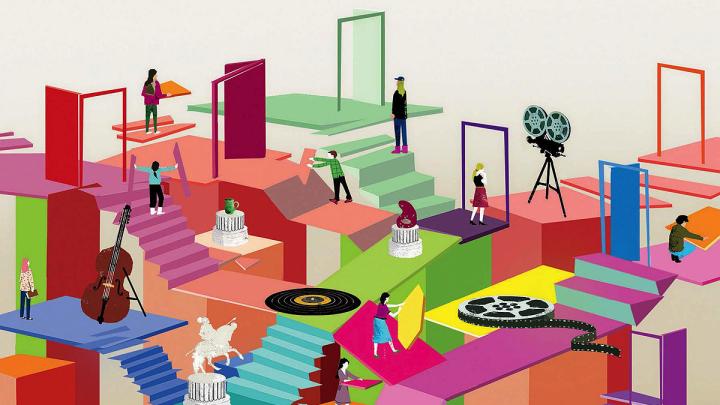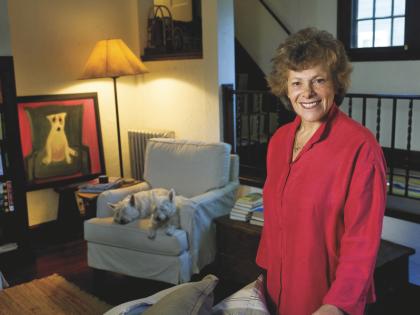I didn’t fully realize the value of a liberal arts education until I was removed from it. Though even as a high schooler I knew that I wanted to go to a “liberal arts school,” that was mostly because I didn’t yet know what I wanted to do with my life. I’d been told I couldn’t afford to be an English major because it wouldn’t help me get a job, and I was never the kind of person who knew at seven or 10 or 13 years old that I wanted to be a lawyer or a doctor. Those two extra years before declaring a concentration seemed critical. “Liberal arts” hinted at the existence of a door that would remain open just a little longer.
Of course, my understanding of the term grew over time. As a first-year enrolled in Humanities 10, I understood liberal arts to mean interdisciplinarity. As a sophomore and junior, it meant having to take a math class even though I didn’t want to—but also retaining a degree of agency over how education shaped my understanding of the world. We are told that a liberal arts education teaches us how to think rather than what to think.
In spring 2023, I got a chance to experience a different approach to education when I studied abroad in Madrid. I wanted to learn in a Spanish-speaking academic environment, so I chose a program that would allow me to enroll directly in a Spanish university. I did not know that I’d be immersed not only in the language but also in a completely different academic system.
In much of the Spanish system, students choose their degree program before their first year. Each program has rigid requirements, and classes are often lectures large enough to accommodate the many students required to take the course, a big shift from my cozy Harvard history and literature seminars. Attendance for most of my classes in Spain wasn’t required. The goal, some course policies seemed to imply, was not to learn and engage with the class material but to memorize it in order to pass into the next level. The emphasis on research was also missing. Now I craved it.
Friends and peers have had similar experiences. Justin Tseng ’21 studied ancient history at the College, and then earned a master’s degree in classical and ancient studies at the University of Cambridge. He noticed a difference between his own undergraduate experience and that of his graduate school peers. “A lot of my fellow master’s students also did their undergrad at Cambridge, so I was hearing from them [how] your entire undergrad experience is based on the subject matter for your degree,” he said.
Charles Hua’s [’22] time at Harvard, on the other hand, allowed for flexible specialization. After some academic exploration, he ultimately concentrated in statistics and math, while also pursuing a secondary in Art, Film, and Visual Studies. Now, he plans to dedicate himself to climate and energy policy. “I think I would have been very surprised in freshman year of college if you told me that that’s what I would study,” he said. After coming across Orchard professor in the history of landscape development John Stilgoe’s class on North American built landscapes during his junior year, Hua decided to take the leap. “I was just really struck by a totally different way of thinking about the world,” he said. “I had always been interested in photography, so there was that dimension of the visual elements to it [that] worked in my favor, but that class really solidified it for me. I was like, ‘Well, shoot, I want to take a lot more of these classes.’” Hua estimated he took classes in nearly 20 different Harvard departments.
Similarly, Kalos K. Chu ’23, an English concentrator with a secondary in Film and Video, arrived at his degree program after exploring classes in a variety of departments. “I think if I had to come into Harvard with a plan of what I wanted to study,” he said, “I might have picked something that might not have led me down the path that I find myself on right now.” After spending this year in Taiwan on a traveling fellowship, Chu plans to become a screenwriter—a goal that was sparked by associate senior lecturer in screenwriting Musa Syeed’s creative writing classes, which Chu called “amazing.” Chu recognizes that Harvard doesn’t offer the training in screenwriting available at more specialized schools, but the College’s liberal arts curriculum gave him a unique opportunity to learn. Screenwriting internships like the one he had at Nickelodeon filled the gap, providing the job-specific skills he will need post-graduation.
I plan to go into journalism, and, like Chu, I’m glad I didn’t have to pursue a more professionally focused education. Though I’ve taken—and loved—writing workshop classes, the bulk of my training has come from The Crimson and summer internships where I got to do the actual work of reporting and writing stories.
In a rapidly changing labor market, learning on the job can’t be avoided, and so I’ve chosen to lean into the flexibility of my Harvard curriculum. When else can one spend six months learning how to navigate using the stars? Or diving into the racial politics of mid-century American musicals? Even as I have pursued these interests, I feel ready for my career path.
But despite the relative freedom afforded by liberal arts programs, they continue to carry a certain stigma, in part because of the idea that a liberal arts degree —particularly one focused on the humanities —doesn’t contribute to a career outside of academia or the arts. The fear that a liberal arts education will not prepare graduates for the “real world” is pervasive. In a 2017 survey conducted by Gallup and Inside Higher Ed in 2017, 69 percent of college admissions directors responded that they disagree or strongly disagree that prospective students “understand the value of a liberal arts education.” And 64 percent thought the same of parents of prospective students.
Liberal arts curricula are often associated with expensive and elite private schools, many of which lack robust financial aid programs like Harvard’s. Especially in the aftermath of the pandemic, small colleges and public institutions alike are shuttering or deprioritizing liberal arts degree programs, citing a shift in focus to more purportedly “pragmatic” fields of study, like STEM fields or more direct, vocational training. As one friend of mine from rural Minnesota explains, smaller communities that are struggling financially “want their kids to go to a school where they’re going to come out of it with a very sure career.” Young people, too, are looking for financial stability. “And so, if choosing a degree that puts you on a very clear track to a profession is possible, that’s what you’re going to do.”
Tseng now works full time as a consultant. Though he said he was initially concerned about his job prospects, he’s since found his classics training to be an unexpected benefit. “For my job, I’m kind of a generalist,” he said. “And I think liberal arts helps you build foundational knowledge but also skills required to deal with that. If you’re dealing with something that you’re not super familiar with, having the research skills and research background to go dig into the problems that you’re facing [helps].”
The increasingly deep binary, with STEM and vocational training on one side, and the liberal arts and humanities on the other, derives from an ahistorical understanding of higher education’s purpose and the false premise that a commitment to the liberal arts and a desire to have a career outside of academia are mutually exclusive. The decision is not between the liberal arts and a job, but between a holistic education and one concerned only with job training, however temporary those jobs may end up being.
In one of my last courses abroad—a “gender” class that ignored gender theory and was mostly a survey of current Spanish law relating to women’s rights—scheduled presentations were derailed by an informal conversation about the limits of the country’s education system. Though students expressed some fidelity to the rigid curriculum based on their fears about future career prospects, there was also a common feeling that its inflexibility hurt more than it helped. They worried that if they didn’t study the actual laws on the books, as this class pushed us to do, they wouldn’t be able to find jobs as lawyers—but they acknowledged that whatever laws they studied could change by the time they got out of school. Many regretted not being able to take classes better suited to their interests, and at times they regretted the degree program they chose or had been sorted into when they were 18 years old.
As an international student entering a Spanish university, I had similar frustrations. I had hoped for a semester studying power dynamics and the many intersections between gender and the law—something similar to what I’d get at Harvard as a concentrator in women, gender, and sexuality studies. What I got instead was 10 weeks of memorizing legal jargon that wouldn’t help me once I left the Spanish context.
This isn’t to say I regret going abroad. I am confident that diving into the Spanish context was an invaluable experience that would have been impossible to create within Harvard’s gates. But, before I came to fully appreciate it as a unique opportunity outside the Harvard academic system, I couldn’t help but feel I was exchanging a valuable semester of research and classroom discussions for memory-based exams and rigid course syllabi. I wanted more from my education than classes narrowly tailored to prepare me for a specific career.
“You have your entire lives to work, and you have your entire lives to gain work experience and skills that are more directly relevant to the job that you’re doing,” Chu said. “And I think college was, for me, something else: a time for me to learn—grow personally, socially, emotionally—and discover things about myself that perhaps I would not have discovered on the job.”
“There’s value in having a college experience… that helps you as you grow in intangible ways,” he added, “because we will have to do the tangible ways of growth”—that is, the hands-on professional training—“on our own.”









